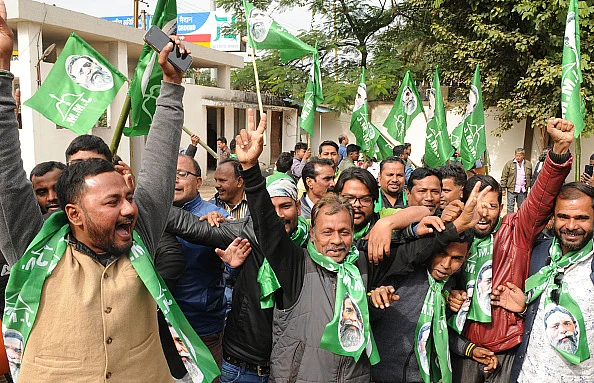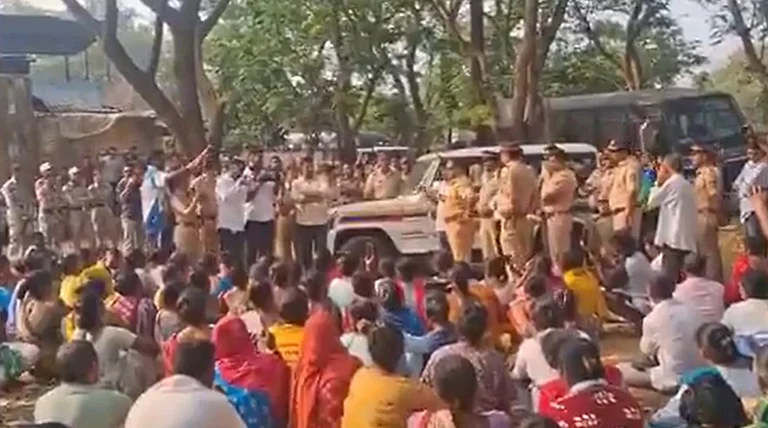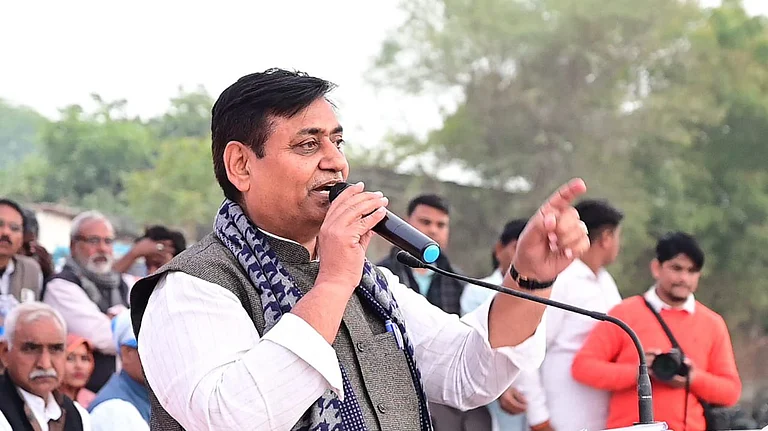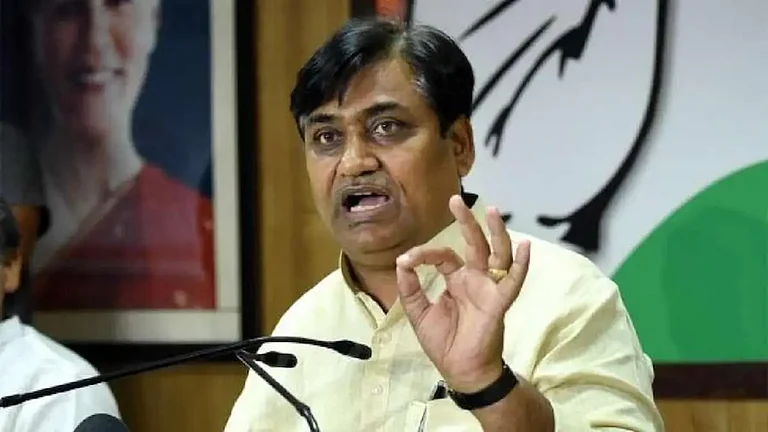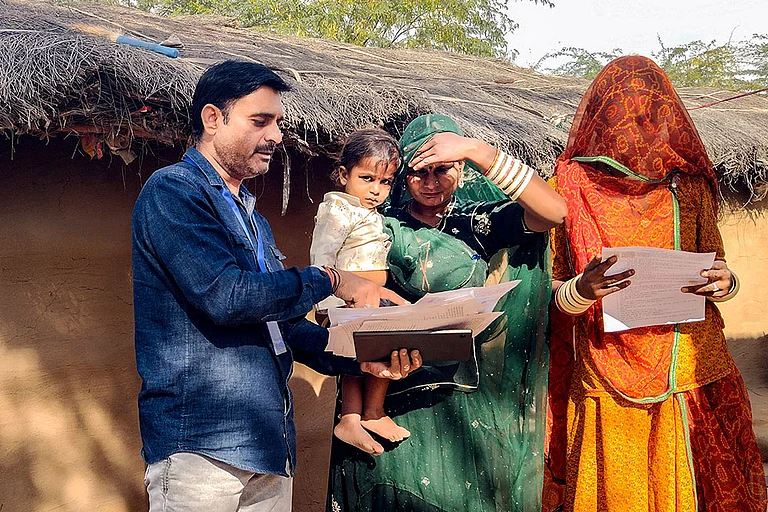BJP’s resounding victory in 2023 Chhattisgarh Assembly Elections --- with a strong vote bank from women and tribal parties --- spoke a lot about the saffron party’s current political strategies in the tribal ahead of the Lok Sabha polls.
With time passing, the presence of smaller, tribal parties with influence in pockets has been estimated to play a role in close contests ahead of bigger elections in the future.
Whether it’s the Bharat Adivasi Party in Rajasthan or the Hamar Raj Party in Chhattisgarh, the rising awareness of the tribal people with their rights and demands may cut across votes and alliances for the bigger players.
Speaking to Outlook earlier, Kunal Shahdeo, a researcher on Adivasi politics said,
“The BJP has gained traction among Adivasi communities in recent years. It is evident in their electoral successes. The BJP strategically portrays adivasis as an integral part of the broader Hindutva umbrella, while some Congress leaders advocate recognising their distinct religious identity. The rise of BAP and Bharatiya Tribal Party (BTP) highlights the concerns of adivasis who have historically faced discrimination, exploitation and marginalisation despite electoral promises from both the BJP and Congress.”
In an interview with Outlook, Kantilal Roat, who was BAP’s MLA candidate from Dungarpur, said that with the alternate governments of the BJP and the Congress, there has been a constant attempt to divide the state’s adivasis into religious lines: yena, kena, prakāreņa (in whatever manner possible). “Currently, tribals in Rajasthan face two major challenges: religious politics and the dirty blame game of the two parties. The day these (things) stop, perhaps the leaders above would realise the true nature of the demands of Adivasis. And trust me, it’s beyond what they think,” claims Roat, who insists that both the BJP and the Congress are alike. “The former practises religious politics openly, while the latter is subtle about it.”
A look at rising Adivasi parties:
Bharatiya Tribal Party (BTP): Since 1993, Rajasthan has seen an anti-incumbency with alternate governments sweeping power in the state. The tribal districts in Rajasthan would also be ruled by the BJP and Congress until 2018, when the Gujarat-based Bharatiya Tribal Party was pulled into the state to help the tribal people with political support to demand their rights rightfully. The BTP had won two seats --- Chorasi and Sagwara -- in its first election and finished a close second in some constituencies. After that with shifting political ideology, both the BTP MLAs — Chorasi MLA Rajkumar Roat and Sagwara MLA Ramprasad Dindor quit the party and joined the Bharat Adivasi Party (BAP) which was formed in September.
Founded in 2017 by Chhotubhai Vasava and Maheshbhai Vasava, the party has an autorickshaw symbol. In 2020, the party formed BTP an alliance with AIMIM in the Gujarat panchayat election and announced an alliance with the AIMIM for the 2022 Gujarat Legislative Assembly election. However, it soon broke its alliance with AIMIM and allied with the Aam Aadmi Party in April 2022. It again broke its alliance with AAP in September 2022 and announced contesting the state legislative elections by itself but lost its two seats
Bharat Adivasi Party (BAP): The party was formed shortly before the 2023 Rajasthan Assembly elections after the political tiff in BTP. It was formed by Rajkumar Roat and Kantilal Road, two senior members of the party. lose second place in several other seats. Years of neglect and unfulfilled promises appear to have necessitated a political platform for tribals, ensuring their 'jal, jangal, jameen' (water, forests, land) rights. Kantilal Roat outlines the emergence of tribal parties advocating for mainstream recognition. In a previous interview, he told Outlook that BTP party was invited to Rajasthan to support the Bhil community's political fight. “However, there was one condition: the BTP would not control them remotely, nor would he (Vasava) impose a decision on us directly,” Roat says.
The Bhil leaders’ victory whetted a hunger for political representation from their own communities among the tribal population. Post-BTP's 2018 victory, Bhil leaders in Rajasthan accused the party of making unilateral decisions without local consultation, notably during the 2021 Dhariyawad bypoll. Growing discontent led to an inevitable split in its ranks. Following the internal party rift, local BTP leaders moved away from the parent outfit and formed BAP, which fielded 27 candidates across reserved ST seats, along with a few general seats for the 2023 assembly elections. On October 9, 2023, the Election Commission allotted a hockey stick and ball symbol to BAP for the Rajasthan assembly polls.
Jharkhand Mukti Morcha (JMM): Founded by Shibu Soren, Nirmal Mahto, and the Marxist Arun Kumar (A.K.) Roy—all of whom were members of indigenous minorities officially classified as Scheduled Tribes--- in 1973, the party was formed out of the movement to demand a separate statehood for Jharkhand. After the formation of the state in 2000, JMM has remained an influential party. The party was officially created on the birthday of Birsa Munda, a 19th-century tribal warrior from Jharkhand, who fought against British rule in the region and on 4 February 1973, Mahato became president of the party and Soren became its general secretary. With several coalitions adding to its success in elections and falling apart, the JMM-led alliance currently has 48 MLAs while the BJP-led coalition of the party of has 29 legislators.
Hamar Raj Party (HRP): Hamar Raj Party (HRP), an outfit floated by Chhattisgarh Sarva Adivasi Samaj -- a unit of tribal groups --- in October last year had declared a list of 19 candidates, including a retired IPS officer, for the state assembly elections which were held in November. Akbar Ram Korram, a retired IPS officer, has been designated the president of the party while BS Ravte will serve as the working president. The party emerged from the demand for rights of tribals including the proper implementation of of the Panchayat Extension in Scheduled Areas Act (PESA).






